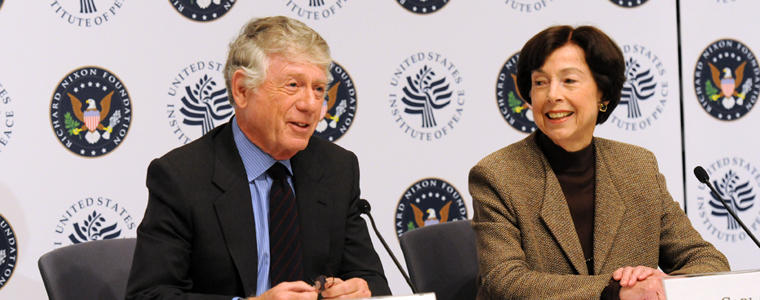The closing panel of the conference, The Week that Changed the World, co-hosted by the U.S. Institute of Peace (USIP) and the Richard Nixon Foundation on March 7, featured senior China policy watchers assessing the uncertain future of U.S.-Chinese relations.

The closing panel of the conference, The Week that Changed the World, co-hosted by the U.S. Institute of Peace (USIP) and the Richard Nixon Foundation on March 7, featured senior China policy watchers assessing the uncertain future of U.S.-Chinese relations. The commentators, most of them former senior U.S. officials, discussed prospects for strategic, economic and diplomatic cooperation between Washington and Beijing. The panel was moderated by veteran television newsman Ted Koppel, who covered the 1972 Nixon trip to China for ABC News.
Carla A. Hills, the U.S. trade representative from 1989 to 1993 and now chairman and CEO of Hills & Company, focused on the need to better understand China, its problems and its ambitions. “Perhaps we’re not well enough informed,” she said, adding that the U.S. government will need more people schooled in China’s language and culture and that bringing them into public service will help make “missteps less likely.” Hills emphasized the importance of building trust with the Chinese, and she suggested that Americans ought to get used to greater reciprocity in the way both sides talk with each other. Said Hills: “We wag our finger at the Chinese and say, ‘Why aren’t you tapping your consumer market?’ They could say why aren’t you doing more” on your debt and deficit.
Cheng Li, director of research at the Brookings Institution’s John L. Thornton China Center, suggested that the perception of the United States by Chinese leaders will change as more who were partially educated in the West, especially the United States, come to power. Li said it was important for U.S. policymakers to emphasize that they do not have a strategy of encircling China and that bilateral tensions are not in the U.S. interest. “We should be more articulate with the Chinese,” he said. China is facing economic risks, including a possible bubble in property prices, inflation and local debts, he said.
Jeffrey Bader, a senior fellow at the Brookings Institution who was the senior director for East Asian affairs on the National Security Council from 2009 to 2011, recalled that some of Asia’s leaders evinced anxiety about China’s rise and often wanted to talk about it with President Obama. However, Bader said, Obama consistently has said the United States welcomes the rise of China but wants its policies and actions to conform to international law and norms. “He pushed back on the notion that we should have this sort of polarity,” Bader said. He also argued that presidential campaign rhetoric about China frequently does damage to bilateral relations—and that once in office new presidents often gain a better appreciation for the approach to China conducted by their predecessors. Said Bader, “There is an unhappy history of China being an election-year issue in the United States.”
Dennis Blair, the former U.S. director of national intelligence and a retired admiral who led U.S. Pacific Command, recalled “lively” discussions with Chinese counterparts about spying on each other. Blair said he was told that U.S. practices suggest the United States does not trust China, but Blair noted that intelligence serves to improve the understanding of policymakers about the intentions and capabilities of others. Blair expressed concern about the scope of Chinese cyber-espionage. Though U.S. officials are encouraging the Chinese to take on greater global responsibilities, Blair said it was his experience that “Chinese [military] forces are not thinking globally.” More broadly, Blair said that China has displayed a combination of “external confidence and internal lack of confidence” in its attitudes, which he described as “a stabilizing factor” for the United States over the long run.